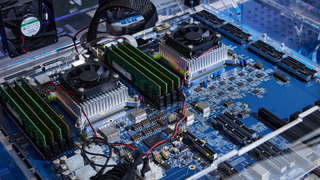Tachyum: Prodigy production starts in 2024
Tachyum is full of optimism about the future, but does not forget to mention 'failed memory and interface IP blocks from key vendor'

Tachyum this week issued a press release where it re-emphasized its plans to start mass production of its Prodigy Universal Processor in the second half of 2024. Tachyum also expressed its optimism about the future, as demand for processors used for artificial intelligence (AI), high performance computing (HPC), and datacenters is set to boom in 2024 and beyond. Meanwhile, the company admitted that it still has not taped out its processor.
"Tachyum showed its resilience during a challenging 2023 when we experienced the worst semiconductor downturn in years and weathered the challenges faced with failed memory and interface IP blocks from a key vendor," said Dr. Radoslav Danilak, founder and CEO of Tachyum.
Meanwhile, a new version of the company roadmap clearly indicates that the 1st Generation Prodigy processor will feature 192 cores, something that was not initially reflected in its December roadmap, though the company fixed the omission quickly. The chip is expected to hit mass production on a 5nm process technology in the second half of 2024, based on the document the company sent to Tom's Hardware.

On the hardware side of matters, Tachyum has made quite some progress, albeit without disclosing any timeline for its chip tapeout. The company says its team 'finishes final debugging and cleaning of the chip.' Meanwhile, the motherboard design team is expected to reveal a reference design of a Prodigy-based machine, but that happens after the chip's design signoff.
"With the final reference chip available, Tachyum will target early adopter markets, including high performance computing and artificial intelligence applications," the company says without elaborating exact timeframes.
On the software side of matters, things look quite promising as the company has ensured 'seamless' execution of ' non-native (x86_64) applications under Linux.' Also, Tachyum managed to integrate a baseboard management controller (BMC) and unified extensible firmware interface (UEFI) platforms into the Prodigy FPGA prototype system, the company said.
"The successes we were able to achieve while tweaking our product roadmap have brought us to a 2024 full of anticipation as we move towards volume production of Prodigy and the fulfilment of a multibillion-dollar sales pipeline," Danilak said. "We look forward to fulfilling our commitment to transforming ordinary data centers into Universal Computing Centers in the near future."
Stay On the Cutting Edge: Get the Tom's Hardware Newsletter
Get Tom's Hardware's best news and in-depth reviews, straight to your inbox.

Anton Shilov is a Freelance News Writer at Tom’s Hardware US. Over the past couple of decades, he has covered everything from CPUs and GPUs to supercomputers and from modern process technologies and latest fab tools to high-tech industry trends.
-
gg83 What are our thoughts? Is this just another FPGA? Could this be a real chalenger, or is there a requirement for a robust software ecosystem like CUDA or whatever?Reply -
Findecanor I see buzzwords.Reply
They have posted YouTube videos supposedly running emulation of other ISAs within QEMU, which is an common open source program, on top of FPGAs.
Their success in the marketplace will depend on many factors, but most of all I think about being cost-effective.
As an assembly geek, I am curious about their ISA, but extremely little about it has been made public.
I'm a bit disappointed that all things point to the current iteration of Prodigy being a (boring) traditional OoO RISC architecture, with no special features announced other than the emulation potential and support for ridiculously low-precision matrix multiplication.
I would like to see security features, like what ARM, Intel and AMD have added to their line-ups in recent years and which are in development for RISC-V. -
bit_user Replydoes not forget to mention 'failed memory and interface IP blocks from key vendor'
You have to sell more than just excuses. Every business has setbacks. Failure to plan for & accommodate these suggests an unrealistic business plan.
Meanwhile, the company admitted that it still has not taped out its processor.
Oof. It'll probably be obsolete, by the time they do.
Launching on a 5 mm node already isn't great. AMD's MI300 is made on N5, for the compute-heavy portions. Nvidia's H100 is made on the N5-derived "4N" node. So, they'll be arriving a late to that party.
Tachyum managed to integrate a baseboard management controller (BMC) and unified extensible firmware interface (UEFI) platforms into the Prodigy FPGA prototype system, the company said.
Creating a new server platform from a clean sheet is a ton of work. Just ask Ventana, whose first generation CPU never achieved volume production. Much of what they're touting about their second gen product seem like baseline features customers would expect of a proper, server-grade CPU.
https://www.tomshardware.com/pc-components/cpus/imagination-and-ventana-to-build-a-risc-v-cpu-gpu-platform -
bit_user Reply
There's a very thorough writeup, here:gg83 said:What are our thoughts? Is this just another FPGA?
https://chipsandcheese.com/2022/08/26/tachyums-revised-prodigy-architecture/
IMO, they're making too many of the same mistakes as their predecessors. History is littered with the bones of over-ambitious HPC startups.gg83 said:Could this be a real chalenger,
It's just really hard to beat the big industry players, especially when you're trying to do it with an all-around uber chip. If they'd just focused on one niche, like AI, that's achievable (but hard enough). By trying to be the best at everything, they're setting themselves up for failure. They'll be going up against Granite Rapids and whatever AMD's Zen 5-based EPYC is called... not to mention a new generation of server GPUs. It's a fool's errand, IMO.
I think their only hope is government/EU subsidies. I'm pretty sure that's the only reason they're still around. Even then, it's not as if they aren't facing competition from other EU-based efforts. -
bit_user Reply
They'll have to upstream their GCC patches, before this thing ships. Most likely, they won't even be able to upstream their Linux kernel patches without taking that step, because it's almost guaranteed to contain some assembly language portions.Findecanor said:As an assembly geek, I am curious about their ISA, but extremely little about it has been made public.
Totally agree.Findecanor said:I'm a bit disappointed that all things point to the current iteration of Prodigy being a (boring) traditional OoO RISC architecture, with no special features announced other than the emulation potential and support for ridiculously low-precision matrix multiplication.
Most Popular





